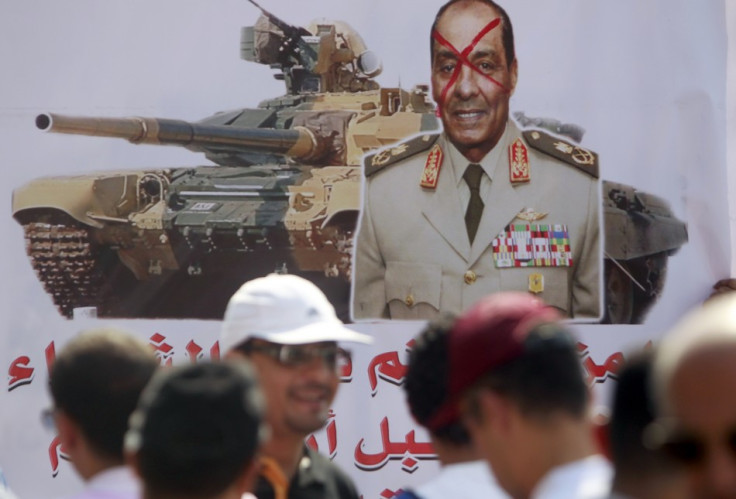SCAF Can Still Determine Egypt's Advancement

On 11 February 2011, the West's "man in Cairo", Hosni Mubarak, was toppled from power, the result of continuing and increasingly violent anti-government demonstrations. After 18 days of civil unrest during which all the Government's concessions had been spurned and with no tangible support from his allies abroad, Mr Mubarak, the President of Egypt for almost 30 years, finally stood down.
During this "Egyptian Revolution", some estimates suggest that as many as 10 per cent of Egypt's 83 million people took to the streets and an Egyptian Government report published in April 2011 put the number of dead during the uprising at nearly 850 with a further six thousand wounded.
Unfortunately, President Mubarak's fall from power did not end further mass protests, now against the country's new ruling body, the Supreme Council of the Armed Forces (SCAF) led by Field Marshall Mohamed Hussein Tantawi. Nor did it end the violence meted out to protesters and strikers who, over the coming months, saw little change or remedy of their grievances by the authorities.
The Government, on the other hand, was intent upon bringing the country under control and stability and trying to stop any further deterioration to the economy - a large proportion of which is under the direct control of Egypt's Armed Forces. A report after a summit on the economy, undated but probably Summer 2011, under the auspices of the Egypt State Information Service showed just how detrimental the unrest was proving. Entitled "January Revolution and Horizons of Economic Growth" reported these stark facts:
- Poverty rates currently stand at 70 per cent
- Economic growth has dropped to between one and two per cent
- Hard currency reserves have declined from $36 billion to $28 billion
- The flow of foreign investment is down to zero
- Budget deficit has reached EGP1290 billion
- The general debt is calculated at EGP1080 billion
- The proceeds from tourism are down by 40 per cent
- The Stock Exchange has lost EGP20 billion
That first point is surely the most damning indictment of Mr Mubarak's near 30 years in power - corruption allegations aside.
The second point is just as serious and could well be worse than officials care to admit. On 29 August 2011, Daily News reporter Reem Abdellatif quoted Alaa Ezz, Secretary General of the Federation of Egyptian Chambers:
"Since the open door policy, where the Government starts to be regulator instead of operator...almost 95 per cent of new employment is by (the) private sector.
"...due to the repercussion of the Revolution where foreign direct investment and local investment have gone down tremendously and tourism has gone down drastically, there are no new investments to take this 95 per cent up."
Mr Ezz goes on to say that the country's population continues to increase by 2.4 per cent per annum, whilst GDP (for 2011) would not increase and could even be negative.
Ending the Report is an appeal:
"With its human resources, its integrated tourism industry and its promising industrial base, Egypt could resuscitate its economy. This however depends on the Government and the people cooperating to restore confidence in (the) national economy.
"Egyptians...should exert their utmost to counter acts of thuggery and violence and attempts at stoking the fires of sectarian sedition. It is essential for law and order to return to the street, for chaos to be put paid to, for rumours to come to an end and for professional protests to be swiftly and decisively dealt with."
The Report finally states that only after this can production be resumed, (foreign) confidence restored and the nation feel safe once more.
A problem for the Government is that it has been trying to appease and control an impatient populace at the same time. There is little doubt that many of the demonstrators in the large series of rallies and strikes witnessed on the world's television screens over the past year, are part of Egypt's large army of unemployed and/or underemployed.
Some 31 per cent of the country's labour force is still employed in agriculture but a surprisingly high proportion of Egyptians are well educated. These are the people suffering the higher rates of unemployment.
Egypt's Daily News quoted an unemployment level of 11.9 per cent for 2011, Q1 with a slight drop to 11.8 per cent for Q2 and Egypt's Independent, stated that Government sources claimed a level of 9.3 per cent at the end of Q3.
Irrespective of the source, all authorities are agreed that the rate of unemployment is much higher in urban areas, roughly 19-20 per cent, which is also the rate for "Youth Unemployment", a category which includes people up to 29 years old. The urban and youth sections of the population are much more likely to have a school leaving certificate.
One can only feel pity though for the unemployed with university degrees as the most recent Government figures in 2012, estimate that this group makes up 30 per cent of the unemployment total. The unemployment rate for men with degrees was put at 26.8 per cent and for women, 55.1 per cent!
Yet it is the level of violence, whether against Coptic Christians, protesters or strikers, that SCAF and those under its command have appeared to be unable or unwilling to contain, or worse, accused of being totally complicit in executing or permitting, that undermines SCAF's authority and Egypt's path to progress.
Whoever wears the uniform of the State - Police, Security or Army - will be presumed to have SCAF's blessing. Once those who have abused their office have been brought to book then Egypt can expect confidence at home and abroad to be restored and economic progress to follow.
© Copyright IBTimes 2025. All rights reserved.






















